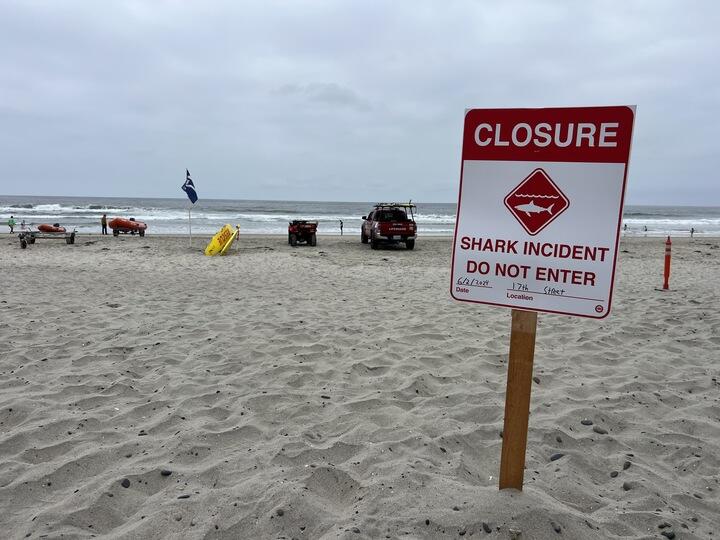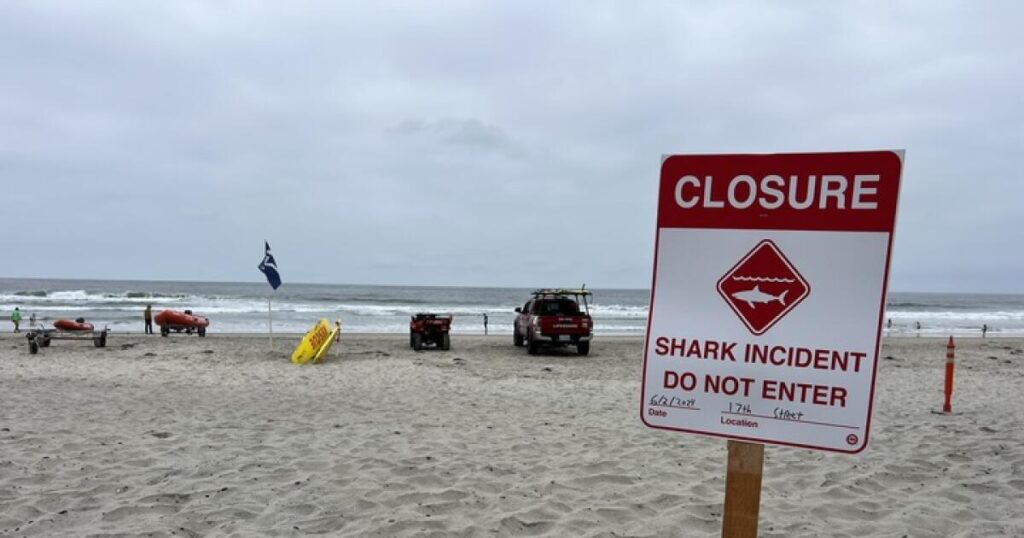
Cameron Whiting had just completed an easy 1.5-mile open water swim Sunday morning while bodysurfing near Del Mar Beach when a member of his swim team Start screaming.
At first, Whiting heard only the fear in her voice; Then his brain thought she was screaming, “SHARK!”
A new member of the swimming team – a 46-year-old man whose name has not been released – was attacked. The woman closest to him was screaming for help.
Since it was before 9 a.m. and lifeguards were not on duty, assistance could only be provided by the swimmers closest to the victim. That was Whiting and another member of the group, Kevin Barrett. The pair were about 100 yards from shore, while most of the others were back on the beach contemplating breakfast.
Barrett walked toward the man and the shark as fast as he could. Whiting, 31, who trained as an ocean lifeguard, quickly scanned the shore to make sure someone was calling for help and then began swimming.
Two fears battled in his mind as he waved his arms violently.
The first was when he realized he was swimming toward an active shark attack. The second was his fear of what he would find when he got there. Will his fellow swimmers retain all of his limbs? Is he still alive?
“That’s what scares me the most,” Whiting said. “To get close to him and realize…”
But as he completed the swim about 50 yards behind Barrett, they found the victim conscious and with all limbs intact. However, he bled a lot.
They were about 150 yards from shore; it was hard to imagine he could have done that on his own. When they turned him over, blood started pouring from his wetsuit.
As they started pulling him toward the beach, a surfer paddled over and held out his board.
They lifted him onto the board and Whiting climbed in behind and paddled. Barrett swam over and stabilized the victim. The woman who called for help followed.
“That’s when I started to see the full extent of the blood,” Whiting recalled. It “gushed out from the sides of the board, leaving a large streak in the water.”
Whiting paddled as fast as he could. It occurred to him that he was “covered in blood and there was a shark outside.” The journey ashore “felt like an eternity, but it could have been just a few minutes.”
Finally, they reached a place where they could stand. Rescuers lifted the man who was still lying on the boat and carried him to the beach.
At that time, the lifeguards who had been waiting nearby for duty had already arrived at the scene.
They placed the victim in the back of the ambulance to assess his injuries.
The victim said he was hit once by a shark and then bitten. Then the shark swam toward him again. He tried to hit it, swinging his fist at its snout and getting a deep cut on his arm in the process.
He also had wounds on his torso where the shark had bitten him the first time.
Whiting said he tried to prevent the man from seeing the deep gash in his chest.
They put a tourniquet on his arm and put as much gauze as they could on the wound on his chest.
An emergency room doctor who was walking the dog on the beach joined them, examined the wound and advised rescuers to continue applying pressure.
Finally, the ambulance came.
As paramedics loaded the man into the car, Whiting tried to reassure him, telling him he was going to be okay.
The man thanked him so calmly that Whiting wondered if he was shocked.
He was rushed to hospital and is expected to survive. On Monday, he woke up and smiled.
Lifeguards closed Del Mar Beach for 48 hours after the attack. Officials urged people to remain calm.
John Ugoretz, environmental programs manager for the California Department of Fish and Wildlife, said the oceans are full of sharks and they rarely harm humans. Scientists speculate that when they attack, they may mistake humans for prey such as seals or sea lions.
“Since 1950, there have been 215 shark incidents in California,” Ugoretz said. “Less than three a year.”
16 of them died.
“Shark encounters are extremely rare,” Ugoretz said. “The chances of you getting stung by a stingray are very, very high.”
One thing is true, Ugoretz said: There has been a huge increase in reports of shark encounters that resulted in no harm, but he doesn’t blame the sharks for it.
“Twenty years ago, if someone got hit but wasn’t hurt, they might tell their friends,” he said. “Now they’re telling the entire Internet.”
National data show that non-harmful shark interactions began to increase around 2004.
Jonathan Edbrock, Del Mar’s chief lifeguard and community services director, said Sunday’s situation may have confused the shark.
He said the light was dim and the water was murky, similar to a shark attack on a human on Del Mar Beach in November 2022.
Whiting doesn’t plan on letting this turn him away from the ocean. In fact, he said, some swimmers in his group are already planning to return to the water, albeit at different beaches.
“We are all passionate about going to sea,” he said.

